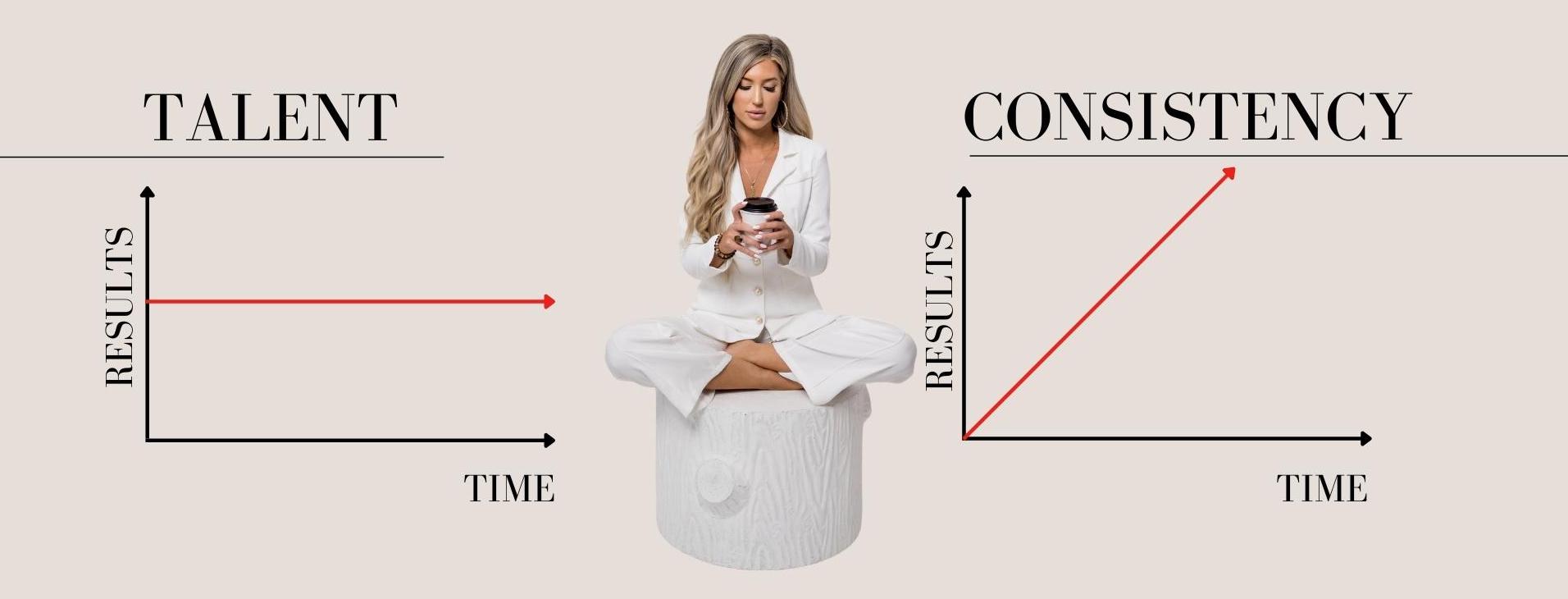4 Tips to Create CONSISTENCY in Your BUSINESS
Sep 01, 2022
You’re not consistent, because you don’t want it badly enough
If we look at the highest performers in any field or industry, what do they all have in common?
🔘 Are they highly intelligent?
🔘 Are they just (really) hard workers?
🔘 Are they more resilient than their competitors?
🔘 Are they more innovative or creative?
Truth be told, any of these factors could ring true – in some cases, they might all contribute to an individual’s perceived success. But there is one key element that is often overlooked, and yet, it is an undeniable catalyst to success in virtually any endeavour.
Any guesses?
It’s CONSISTENCY.

As the saying goes, “success doesn’t come from what you do occasionally, it comes from what you do consistently.”
Beyond occasional strokes of incredible luck, the results you see will always reflect your discipline; consistent action creates consistent results. Of course, as any entrepreneur knows, consistency is a learned skill, and good weeks (or even months) of consistent effort may be followed by frustrating lulls of waning motivation.
Oftentimes, consistency felt like the elephant in the room – the silent but undeniably impactful force that was standing in the way of the many ambitious goals I had set out to reach.
That is until I got real with myself – and now, with your permission savages, I’m going to get real with you.
You’re not consistent, because you don’t want it badly enough.
It might not be what you want to hear at this moment (I didn’t want to admit it either, at the time), but it really is that simple.
When you want something badly enough, you will make the micro-improvements necessary to make that goal a reality.

Not So Fast… Let’s Set Some Intentions
Before we dig in, I want you to take a moment to get clear on your intentions. As you’re reading this, what is the thing (or the area of your life) that you feel lacks consistency? If you’re a business owner, what aspect of your business is lacking and needs more structure?
Once you have that in mind, I want you to ask yourself the following question:
Why does that matter?
Why would implementing consistency in that area of your life positively impact your business?
Before you aim to make any meaningful changes, you must first connect to that ‘WHY’, so you can truly understand and embrace that demand for more consistency.
After all, if you aren’t convinced of its importance, you will be hard-pressed to commit to the pursuit of it.
Fortunately for you, as a business coach who has worked with countless entrepreneurs struggling with remaining consistent, I have nailed down the 4 best ways to stay consistent in your business(es), or in anything you’re trying to achieve, for that matter.
Tip #1: Start Small

If you’ve never run a day in your life, it's highly unlikely that you could become a triathlete overnight (or even within the month, for that matter).
Certain things in life can’t happen simply because you hope for them, visualize them, or try to manifest them into reality.
Trust me, I wholeheartedly believe in the power of manifestation, but in this case
– it’s just not how things work.
Instead, you need to start with small steps; micro-adjustments if you will.
If we use the running example, and your goal is to run a triathlon, your first step might be running a block. Then two blocks, then four blocks, and so on.
The reason most people fail to reach their goals isn’t due to a lack of vision or even intention – it’s because they are trying to go from 0-100. They are, quite literally, biting off more than they can chew.
The real magic happens when you get really good at going from 0-1, over and over, until it becomes a cemented, unimpeachable habit. These small, manageable increments build confidence and allow you to start ‘stacking’ your habits until you reach a new level.
Let’s consider the story of Thomas Edison, the inventor of the lightbulb. Did you know that it was on his 1,001 attempt that he had his breakthrough? Imagine he stopped at 999! For a secret story of my own, check out the podcast episode I released dedicated to this topic.
So, friends, listen up – if you’re setting huge, ambitious goals in your business, that’s great – but remember that you cannot reasonably expect to go from 0 to that goal.
Consistency can be achieved when you set yourself up for success with small, manageable action items.
Start small, celebrate those small wins, and stay on track toward the big picture.
Tip #2: Only Make Promises You Can Keep

If breaking a promise to someone else is a big deal, shouldn’t we treat promises we make ourselves with the same importance?
Let’s be frank, if we want others to trust us (for example, our customers or clients), we must be able to TRUST OURSELVES FIRST – and that starts with valuing our own word and making promises we can wholeheartedly commit to.
Consider this – if you want to start working out 7 days a week, but you haven’t been to a gym in 2 years, promising yourself that you will immediately hit that 7 workouts/week threshold is, simply put, unrealistic.
It’s not a promise you are likely to keep.
Instead, promising yourself that you will work out 2 days a week initially is more attainable and, therefore, more likely to lead you to long-term success.
Alternatively, if you consistently set yourself up for failure or disappointment, it will become increasingly more difficult to take action and change course.
So… start with small goals and small promises. Write them down on a piece of paper and stick that piece of paper somewhere where you will see it every damn day.
Remind yourself of your goals and promises, and constantly train the muscle that is CONSISTENCY.
Tip #3: Green and Red
Alright, it’s time to get a little more granular. The next step is to establish what I like to call a list of green and red habits. To paint you a picture, I’ll map out mine here:
My ‘GREEN’ list details habits (promises and systems) that support the areas of my personal and professional life which demand more consistency.
So, for example, if I am trying to improve my time management habits, I would need to:
- Become aware of my energy sources
- Make a list of dynamic and static priorities
- Download a time management system or calendar
- Start tracking my time to complete tasks
- Include all my daily tasks, including basic things like showering, laundry, and commuting
- Set aside 1 hour every Sunday to plan your week properly
These are my GREEN items – AKA the things that I maybe haven’t done yet but need to start doing to become more consistent in the realm of time management.
Now, my ‘RED’ list will detail the things, the habits, and the actions that negatively impact the end goal. In my example, my red list might include:
- Scrolling on social media for an hour before bed (Can I stop doing this for 3 days and see how I feel?)
- Using an old-school paper and pen agenda to plan my week – Why not get rid of this system and use a digital calendar instead that can sync with my project management tool?
- Approaching work and life reactively – If I’m not setting aside time to sit down and actively plan by week, I’ll fall into the trap of letting my day happen to me, rather than the other way around.
From these two lists, I can clearly see the things I need to start doing and, conversely, the things I need to stop doing in order to become more consistent. Don’t let your RED list (the bullsh*t excuses, if we’re being honest) stop you from achieving the consistency you desire.
Good news – this leads me perfectly into my last tip, which just so happens to be the most important one.
Tip #4: Take Imperfect Action

Imperfect action is always better than a lack of action – it really is that simple.
Think about it… if you spent one more hour this week planning and creating content than you did last week, even if that content isn’t perfect (or something you want to release or publish), you’re still trending in the right direction.
You’re still making improvements, even if it’s only 1% at a time.
James Cleary explains this process at incredible length in his best-selling book, ‘Atomic Habits’. Throughout each chapter, Clearly demonstrates the ways in which small habits lead to big changes – helping his readers get 1% better every day.
The 1% rule he references states that, over time, the majority of the rewards in a given field will accumulate to the people, teams, and organizations that maintain a 1 percent advantage over the alternatives. You don't need to be twice as good to get twice the results. You just need to be slightly better.
REMEMBER! Perfectionism is often the enemy of outcome (ironic, isn’t it?) simply because it gets in the way of action – and as great as tips 1-3 are, they won’t get you anywhere if you don’t lift your head off the pillow, put one foot in front of the other, and actually take action.
Every great idea or great intention requires action to come to life, so it’s time to stop thinking about it, and start actually chipping away at it in tangible steps. Get messy, make mistakes, and just start taking action. After all, who could possibly work harder for your dreams than you will?
So, ask yourself,
Do you want it badly enough?
If the answer is yes – what are you going to do about it?
ICYMI, you can listen to the full podcast episode here on Spotify or Apple Podcast.
I’ve also just released the
1:1 Business & Branding Bootcamp program,
which was designed to help you to create BIG strides in your business with 1:1 support
Click HERE for more information!
If you want to Improve your Time Management Habits, take a look at my FREE Time Management Training by clicking HERE
Stock Images: PEXELS
GET OUR BUSINESS & MINDSET BLOG
Directly to your inbox
We hate SPAM. We will never sell your information, for any reason.



